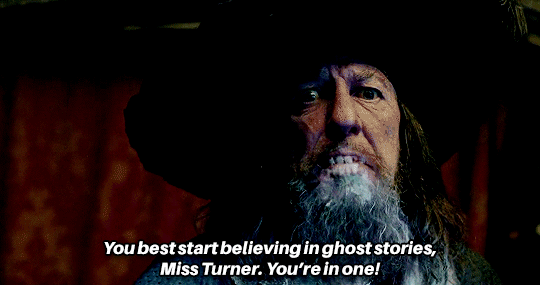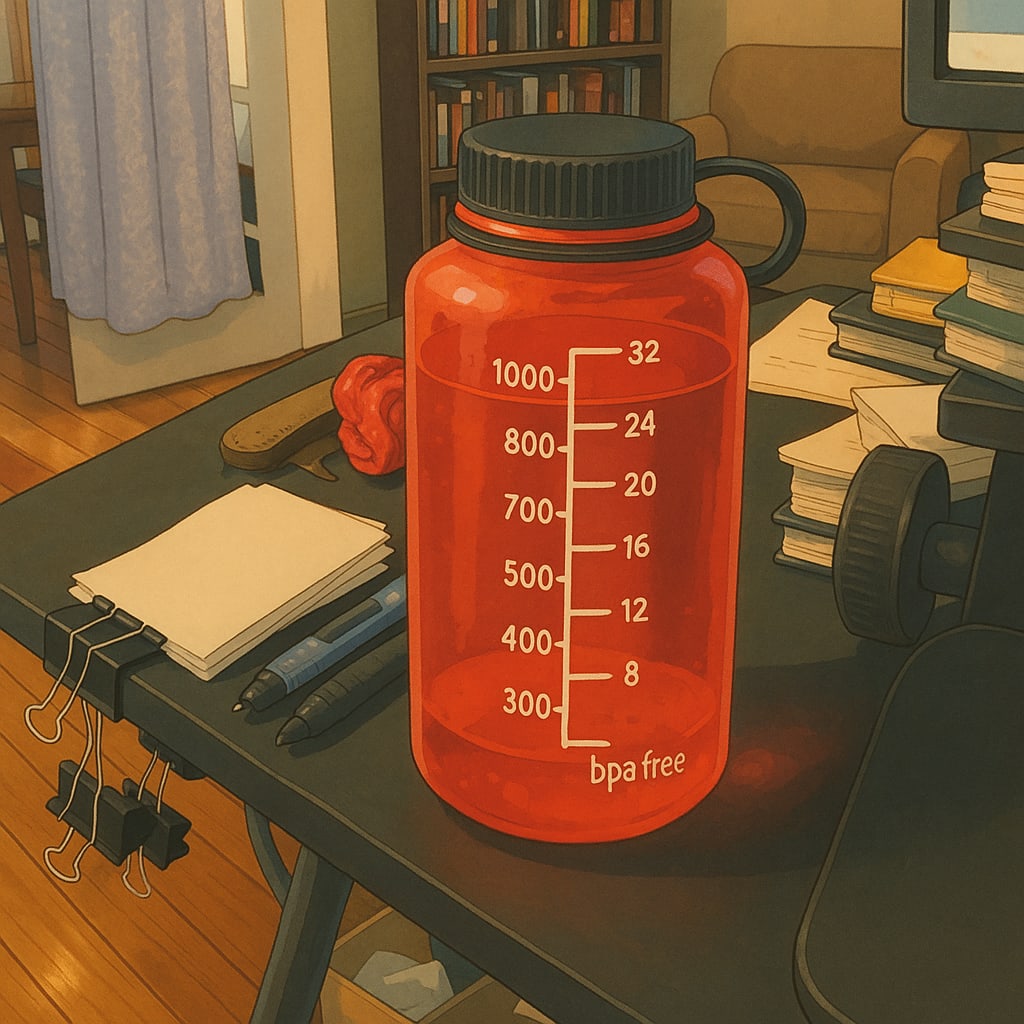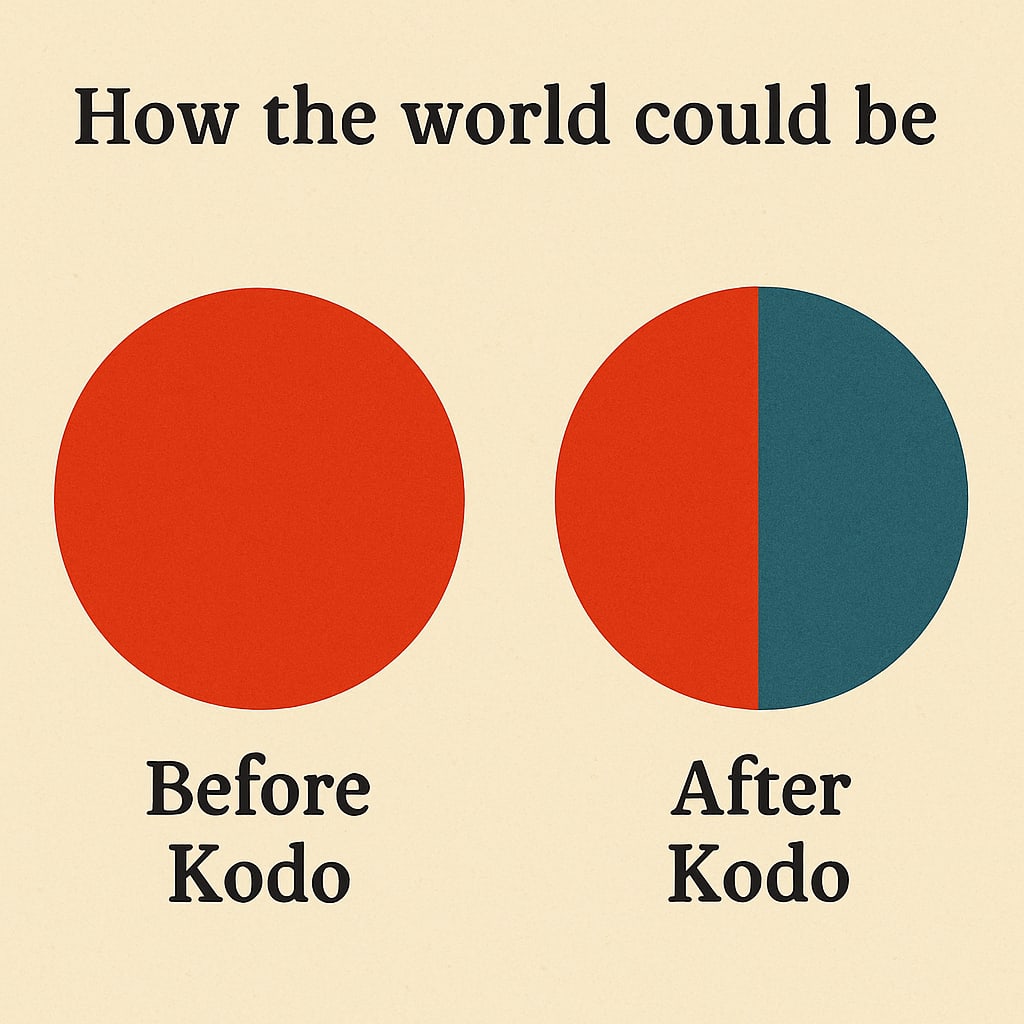Kodo and Din
post by Screwtape · 2025-04-26T18:54:40.590Z · LW · GW · 3 commentsContents
I. II. III. IV. V. None 3 comments
I got these words from a Duncan Sabien lecture and kept wanting to link to them. Since Duncan hasn’t written them up as an essay yet, I’m doing it with permission; I’ll update with a link to his version if he ever writes it.
I think it’s traditional to say all mistakes are mine when writing up someone else’s ideas. I’m not that greedy though, so lets say I get half the mistakes for anything I misunderstood and Duncan can keep half the mistakes for anything he taught wrong. =P
Short version: Kodo is what would be different, and din is what would be the same.
I.
The world is real.
You’re in the world. It’s a certain way, and that’s true. You can perceive the world to some degree.
As I type this I’m sitting at my desk, and a water bottle is a bit to my left. It’s red, which I can tell because I can look at it with my eyes and see the colour. The water is cool, which I can tell by putting my hand against the side and feeling the temperature with my palm. The water bottle is a real physical object and my senses are at least somewhat connected to the real physical world.
I say all this as a prerequisite. If your position is that all is solipsistic imagination or that we can never really know how the universe is or something along that line, I'm not going to try to argue with you here. I'm just asserting the world is real and moving on.
II.
Kodo is what would be different.
It's the test, the discriminator. If you're not sure what world you're in, whether the water is hot or cold, whether the water bottle is red or blue, the kodo is the information that tells you the answer, or at least hints.
You reach out to touch the water bottle, and your hand feels hot; that sensation is kodo for the temperature of the water. If the water was cold, your hand would feel cold. You run a survey of a hundred random homes and half of them have televisions; the survey responses are kodo for whether most people have televisions. If basically nobody had TVs, you wouldn't have that many people saying they had TVs in the survey. You go to look at the haunted house after midnight, and see a glowing figure walking through walls; that's kodo for whether ghosts exist.

An important note: Kodo distinguishes what's going on. It rules some possibilities out. Even if a piece of kodo doesn't completely convince you of a conclusion, it narrows what might be happening.
Take the water bottle. It is possible that the bottle is very well insulated and also the bottle has been sitting in the sun. In that case, the outside of the water bottle might be warm, but the water inside is cold. Totally possible, totally consistent with the bottle feeling warm to my touch. I might say to you, "hey, the bottle feeling warm is kodo for the water being warm, the bottle feels warm, so the water is warm." Then you might think for a moment and say "wait, what if it's just well insulated?" Sure.
But the possible options have narrowed a lot here. We're not talking about some abstract probability of water temperature. We are instead ruling out a lot of specific ways the world could be. We're not talking about what subjectively sounds convincing to you. We're talking about what would have to be observably a particular way.
If you see a glowing figure walk through walls in the so-called haunted house, you still might not believe in ghosts. But you do have some kodo that rules out "nothing weird is going on, it's all rumours."
Seek kodo.
III.
Din is what would be the same.
Din does not discriminate. Din is the pointless question, the flood of noise and static in the signal. Din just happens either way, you know?
You ask a hostile foreign power if they assassinated your military commander. You ask a convicted embezzler if they have yet more money hidden away. You check the oven thermometer in the middle of baking dinner when asked if it's a hot day outside.
The answers are just Din. Empty noise, meaningless symbols, divorced from the real world. They'd say that anyway.

My water bottle has numbers written on it, measuring how much water is there. There's ounces and there's milliliters. (And yes, the scale is off. Pretend that part's right.) Based on that, am I American or Canadian?
Din! Canadians and Americans both use both in different situations, so it's not at all weird for a water bottle to show milliliters and ounces. It's not evidence for either of those really, it barely rules anything out other than I have a water bottle.
Many properties of the world are irrelevant to a question. I've got a deck of cards on my desk, is that din for whether I'm Canadian? Yes, Canadians and Americans both use pretty much the same poker decks. I've got a bright red bandanna on the desk, but that's also din for my nationality. My passport, now that's not just din.
Notice din.
IV.
Now words people speak, those are interesting.
Some people are careful and honest, being clear when talking about what they observed vs what they inferred, only telling you what they remember actually happening. Other people will fabricate details or entire events from whole cloth, whether because they don't track it carefully in their own head or out of a planned effort to deceive.
But kodo is about what gets ruled out.
If I tell you that last night I saw a ghost, this translucent green figure that glowed and walked through the living room door of the old haunted house down the street, no I'm not joking I swear it happened, then what world are you in?

Maybe I saw a ghost. Maybe I saw something that looked like a ghost but wasn't, a really good prank set up by someone else. Maybe I'm full of it and I spent last night dreaming up this story for some reason. Maybe the door just squeaked and the wind blew a curtain and I panicked and my brain filled in the rest. Maybe you go back there with me tomorrow night and you see the ghost too and it tells you it talked with your great grandfather in the afterlife, telling you things it should have no way of knowing.
Some people's words are better kodo. If they tell you they saw a ghost, many possibilities are erased. They wouldn't lie for no good reason.
Some people's words are basically din. If they tell you they saw a ghost, that doesn't even rule out much about what sentence will be next out of their mouth.
V.
Kodo is what would be different.
Din is what would be the same.
There is always at least a little kodo.
There is always at least a little din.
3 comments
Comments sorted by top scores.
comment by purple fire (jack-edwards) · 2025-04-27T00:58:10.459Z · LW(p) · GW(p)
How are these ideas different from "signal" and "noise"?
comment by Rana Dexsin · 2025-04-26T22:23:45.161Z · LW(p) · GW(p)
Is there a known etymology for these? Also, what do people think of as the existing native-sounding pair closest in meaning to this pair?
My guess would be that “din” is an abstraction of English “din” as in “noise”, and “kodo” might be via Japanese “鼓動” (kodō) = “beating” (especially including for heartbeats).
↑ comment by gwern · 2025-04-27T00:34:43.030Z · LW(p) · GW(p)
Kodo here is definitely a reference to "Kōdō" (random Knuth).